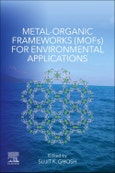Metal-Organic Frameworks for Environmental Applications examines this important topic, looking at potential materials and methods for the remediation of pressing pollution issues, such as heavy-metal contaminants in water streams, radioactive waste disposal, marine oil-spillage, the treatment of textile and dye industry effluents, the clean-up of trace amounts of explosives in land and water, and many other topics. This survey of the cutting-edge research and technology of MOFs is an invaluable resource for researchers working in inorganic chemistry and materials science, but it is also ideal for graduate students studying MOFs and their applications.
Please Note: This is an On Demand product, delivery may take up to 11 working days after payment has been received.
Table of Contents
1. Introduction Sujit K. Ghosh and Susumu Kitagawa 2. Metal-organic framework-based carbon capture and purification technologies for clean environment Soumya Mukherjee, Amrit Kumar and Michael J. Zaworotko 3. Sensing and sequestration of inorganic cationic pollutants by metal_organic frameworks Zachary Lawrence Magnuson and Shengqian Ma 4. Metal-organic frameworks for recognition and sequestration of toxic anionic pollutants Aamod V. Desai, Shivani Sharma and Sujit K. Ghosh 5. Metal_organic frameworks for the capture of volatile organic compounds and toxic chemicals Kevin Dedecker, Eddy Dumas, Bertrand Lave�drine, Nathalie Steunou and Christian Serre 6. Metal-organic frameworks for capture and detoxification of nerve agents Ashlee J. Howarth, Marek B. Majewski and Omar K. Farha 7. Metal-organic frameworks for capture and degradation of organic pollutants Peng Zhang, Qi Wang, Yu Fang, Wenmiao Chen, Angelo Kirchon, Melih Baci, Mingbao Feng, Virender K. Sharma and Hong-Cai Zhou 8. Metal-organic frameworks for detection and desensitization of environmentally hazardous nitro-explosives and related high energy materials Partha Samanta, Subhajit Dutta and Sujit K. Ghosh 9. Green deoxygenation of fatty acids to transport fuels over metal-organic frameworks as catalysts and catalytic supports Liqiu Yang and Moises A. Carreon 10. Potential of hydrophobic metal-organic framework-based materials for environmental applications Syamantak Roy, Subhajit Laha and Tapas Kumar Maji 11. Radionuclide sequestration by metal-organic frameworks Chengliang Xiao and Shuao Wang 12. MOF-based devices for detection and removal of environmental pollutants Raffaele Ricco, Mark J. Styles and Paolo Falcaro








